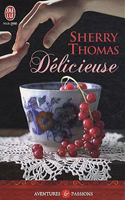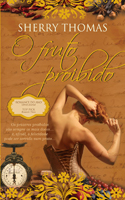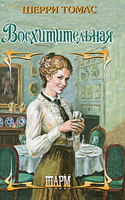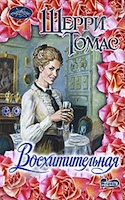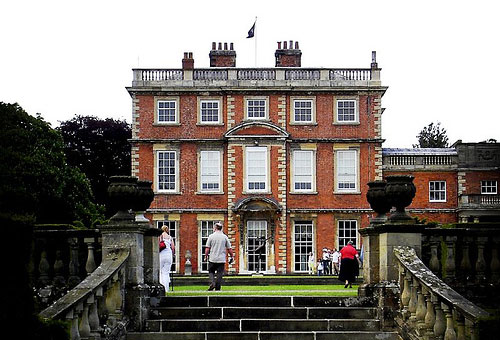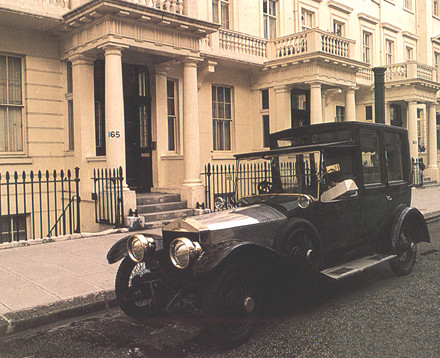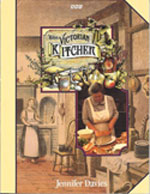Bantam
July 29, 2009
Mass Market Paperback
ISBN-13: 9780440244325
ISBN-10: 0440244323
Order Ebook:
Delicious
Read an Excerpt »
Order the Book »
Read the Reviews »
Go Behind the Scenes »
International Editions »
Best Book of 2008.
"Scrumptious Victorian confection...
A Cinderella story with a compelling culinary twist."
—Publishers Weekly
Famous in Paris, infamous in London, Verity Durant is as well-known for her mouthwatering cuisine as for her scandalous love life. But that's the least of the surprises awaiting her new employer when he arrives at the estate of Fairleigh Park following the unexpected death of his brother.
Lawyer Stuart Somerset worked himself up from the slums of Manchester to become one of the rising political stars of England's Parliament. To him, Verity Durant is just a name and food is just food until her first dish touches his lips. Only one other time has he felt such pure arousal—a dangerous night of passion with a stranger, a young woman who disappeared at dawn. Ten years is a long time to wait for the main course, but when Verity Durant arrives at his table, there's only one thing that will satisfy Stuart's appetite for more. But is his hunger for lust, revenge—or that rarest of delicacies, love? For Verity's past has a secret that could devour them both even as they reach for the most delicious fruit of all...
Share:
Watch the Trailer
The Story about the Story
The Original Proposal | The Journey | Trivia | Bits of Research
The Original Proposal
(Presented for your entertainment. And don't worry if you haven't read the book yet. The book is nothing like the proposal.)
Blurb
Remus Somerset's overriding goal in life is to cleanse the stain of his illegitimate birth. He has done so well that only one thing stands between him and a letter patent creating him the newest peer of the realm: a suitable wife.
Verity Durant is no one's idea of a suitable wife. A chef to rival Escoffier, perhaps, but a woman both notorious and unapologetic, with a potent allure and a past as dark and mysterious as the truffles she shaves into her famous omelettes.
Remus would allow no woman to despoil what he'd purchased with years of sweat and toil. Verity refuses to ever again fall for an employer who would only use and discard her. But a fierce attraction compels them closer, yielding a dangerous affinity that would not be denied, and a pleasure that was all too...
Outline
Remus Somerset spends his entire boyhood as a gentleman's bastard. The experience fuels his ambitions. He vows that he would become a greater man than his father, that he would cleanse the stain of his birth through overwhelming success. By the time our story opens, at age thirty-seven, Remus has done so well that only one thing stands between him and a letter patent creating him the newest peer of the realm: a suitable wife.
His half-brother's sudden death, in the prime of life, unexpectedly bequeaths Remus the Somerset ancestral seat, and the infamous Mme. Durant, chef to the late, gastronomy-obsessed Bertie Somerset.
An eon ago, Verity Durant had been Vera Arlington, a pretty, frivolous girl with little on her mind except the newest frocks and the most handsome young men. But when her guardian decides that she is a trollop and therefore his for the plucking, she runs away from home and vows never to return.
She survives and learns the art of French cooking from a talented young French chef. But her heart still clings stubbornly to the fantasy of a triumphant return to Society. She refuses Simon's offer of marriage and instead tries to win a proposal from Bertie Somerset, her employer. She learns a hard and bitter lesson there, losing Simon and gaining neither wedding ring nor self-respect.
She believes she'd outgrown all her old illusions by a decade and more. But then Remus Somerset enters her life. She knows he views her as merely another asset in his quest for 10 Downing Street. All the same she is overcome by a fierce, maddening attraction to this man who is as powerful and solitary as a wolf in winter, who refuses to let himself be seduced by her food, who yet condenses a lifetime of longing into one swift glance.
Remus finds himself utterly unable to concentrate on his work or the debutantes being paraded before him. Mme. Durant, who is supposed to be merely a corpulent tyrant in her little fiefdom of the kitchen, has turned out to be a woman of potent allure, with a steeliness and a weariness that speaks to something deep inside him.
But he cannot not let her distract him. He'd purchased his present position with years of sweat and toil. No matter what ferocious emotions she rouses in him, he would not be laughed out of parliament as the MP who marries his cook. He would not give up the opportunity to do some good in his lifetime for reasons as paltry as personal happiness.
Verity refuses to ever again fall for an employer who would only use her and give her nothing in return. But then she finds out that years ago he'd indirectly saved her from the workhouse, and all her resistance crumbles.
They enter into a consuming clandestine affair. But Verity sets her limits clearly. She would not be the cause of another woman's misery. When he settles on a suitable young lady to marry, she would leave Fairleigh Park and never see him again.
Remus, meanwhile, uncovers her former identity. He is overjoyed. He certainly could marry Vera Arlington, the granddaughter of a viscount. But Verity refuses. Vera Arlington no longer exists. Only Verity Durant.
He beseeches. He pleads. But she would not budge. She is proud of who she is, a woman who produces feasts worthy of kings and who is the de facto mistress of Fairleigh Park. It has taken her all her life to become this strong, independent woman. She will never marry someone who is ashamed of her position in life.
They come to a parting of ways, she heading to Paris where she commands astronomical fees for her culinary skills, he proposing marriage the next week to the daughter of his mentor.
Three months later, Remus hears rumor of her pregnancy. The dilemma torments him, but in the end, he decides to do the honorable thing. After taking care that his fiancée breaks off the engagement, he goes to Paris and inform Verity that he will marry her.
Not really being pregnant and not knowing the reason behind Remus's sudden change of heart, Verity is ecstatic. But after their passionate reunion, she quickly discovers the true reason he'd come back to her.
This puts her into a terrible quandary. She wants him for always. And she could easily become pregnant, were they to continue in their mutually fervent desires. But she tells him the truth instead.
Remus tells himself he'd been spared. He's done the honorable thing and now he can have his career, his respectability, and one day, his title too. But he cannot forget the pure joy he feels in her arms, the peace, and the deep understanding between two people who've fought hard for everything they have.
He dines at the restaurant where she is chef and keeps sending back everything to the kitchen, enraging Verity, until she finally finds a ring located in a dish of soufflé he has rejected.
What about his career and his all his ambitions, she asks.
They are only a substitute for what I've always truly wanted, he answers.
But Remus doesn't come away altogether empty-handed in the career and ambition category. When Edward VII came to the throne, he knights Remus. Two years later, Remus is elevated to Baron Fairleigh for his distinguished service to the Empire.
The secondary romance in this story revolves around Georgina Boyce, Fairleigh Park's very young housekeeper, and Edwin Cooper, the young new bailiff Remus has brought in. Georgina is the illegitimate daughter of a gentleman. She still dreams, much as Verity once did, of Prince Charming. She desperately wants to be Remus's wife. It takes a lot of growing up on her part to realize that she can achieve happiness without an exalted position.
Note: Although both main characters seem to have backstory-heavy lives, I do not envision parallel timelines, nor significant flashbacks.
The Journey
Sherry chuckles whenever she comes across the original proposal for DELICIOUS, especially the note at the end about how she didn't foresee any significant flashbacks. (It's nothing compared to the dual timeline structure of PRIVATE ARRANGEMENTS, but the flashbacks are there alright.)
She submitted the proposal in August 2006, shortly after she started grad school—as plan B, since the writing thing didn't seem to be working out. But then PRIVATE ARRANGEMENTS sold to Bantam a week after grad school classes began and Sherry was asked to submit a proposal for the second book in her two-book contract.
Sherry is not an idea person. At any given moment, she has probably two or fewer workable ideas in any subgenre of romance. So she gave a pair of historical proposals—all the ideas she had at that time—her editor chose the one about the cook, and a deadline was set for April 1, 2007.
In retrospect the arrangement was nuts. Her grad school was a three-semester crash program. Her schedule was jam-packed with classes. And here was this book to write too. But in the initial excitement of getting published, all seemed possible, and Sherry plunged fearlessly into her new endeavor.
She set a daily word count target, and steadily met it for quite a while. The first significant deviation from the proposal came in the form of the secondary romance. A housekeeper and a secretary simply aren't going to spend that much time together, and as soon as Sherry met Lizzy Bessler she knew that Lizzy was going to be the secondary heroine instead. At some point that autumn, the hero's name also changed, from Remus to Stuart. Otherwise Sherry followed the outline. By the end of November she had about 35,000 words, so percentage-of-completion-wise she seemed to be on track. Except she was stuck: the story could proceed no further.
Beginning of December, on a break from studying for finals, she watched a few snippets of the A&E production of PRIDE AND PREJUDICE. As Mr. Darcy and Elizabeth came out of the church, a newlywed couple, Sherry had an epiphany: Stuart and Verity had known each other before.
She had emphatically not wanted to write another reunited-lovers story. But the original proposal, while fine in theory, simply did not work when expanded. There was no way a man did not come across as smarmy going after his servant. They had to have been one-time lovers. Only then he could pursue her with Sherry's blessing.
So the original 35,000 words went into a discard file. Sherry wrote madly during her Christmas break. She tried to write as much as possible in January and February, while she worked an internship as part of her curriculum. But 60-hour-plus work weeks meant very little progress on the book front. So it all came down to the month of March as she wrote and wrote, falling asleep in class at times. She managed to submit the manuscript in the first week of April.
She breathed a sigh of relief even though she knew the manuscript to be highly imperfect. What she didn't know was how imperfect it was. When her revision letter came, it was sixteen pages—single-spaced!
Well, when something sucks that much, it is best to restart from scratch. So that was what Sherry did. She tossed out the entire primary romance to write everything afresh. A new deadline was set for some time in September of 2007. And then came the worst part of her schooling, the summer semester, with as many classes as the fall semester, in about half the time. She was swamped with school work. The book progressed in fits and starts.
She had her second epiphany one summer morning, riding the bus to campus: DELICIOUS was, in truth, a re-working of a Cinderella story. By that time, she'd gone through four different openings to the book. With the epiphany came the fifth and final opening. She knew now how Verity and Stuart had first met, and how they would meet again.
It was another mad dash to the finish in September. This time, her editor only hated half of it: The first half of the book was fine, but the second half derailed. Back to the drawing board.
While pondering how to fix the second half of this story that simply refused to gel properly, Sherry had her third epiphany (would that she had them closer together!), this time concerning the exact point Stuart realizes his cook is also his long lost,but never forgotten lover. And also concerning Stuart's character—what kind of man he really is, and how trustworthy his honor.
With that, the pieces of the story finally fell in place. She tossed out and then rewrote the second half of the primary romance and all of the secondary romance. Fortunately school was by now behind her, and she made her December 31 deadline just a little after January 1, 2008, sixteen long months after she first started the book.
She could not have done it without her editor's patient guidance—and swift kicks in the seat when Sherry needed it. All Sherry can say is she is truly happy with how DELICIOUS turned out, given that she was convinced at various points that it was going to kill her fledgingly career outright. The biggest lesson she took away from her 16-month struggle is to dig deep into the emotional core of a story.
It is there, always, waiting to be discovered.
Trivia
The word "delicious" is never used to describe food in DELICIOUS.
The unnamed young girl who gives 17-year-old Verity a necklace in Chapter 7 is none other than Gigi, the future Lady Tremaine. At some point in Sherry's endless drafts for the book, they had a face-to-face meeting in 1892. But Sherry eventually took out the scene as it stopped the forward momentum of the book altogether. Instead she's decided that Gigi and Verity will only meet much later, in 20th century, when their children become involved with each other.
And why would Gigi and Verity ever have a chance to meet at all in 1892? Because Gigi wants Stuart to be her barrister, should it take a divorce to free her from her husband (DELICIOUS takes place approximately 6 months before PRIVATE ARRANGEMENTS). Stuart, of course, cannot take on such a controversial case just as he is about to lead a legislative battle over Irish Home Rule, so Gigi has to look elsewhere in the end. That tidbit also ended up on the cutting room floor, as no matter how Sherry phrased it, it just seemed too much info-dumpery.
Verity Durant means "enduring truth," a pretty good nom de cuisine. :-) But Verity is English, not French. The French equivalent is "Verité." Sherry had a choice to make. And she went with the one that was easier to type. Now you know the extent of her artistic dedication. :-)
Bits of Research
Fairleigh Park, the manor Stuart inherits from his brother, is based on Newby Hall in North Yorkshire. The house was built in the seventeenth century with input from Sir Christopher Wren. During the following century the interior was renovated by Robert Adam.
Image by PaintMonkey
Image by Xerones
Image by DvdBramhall
In creating 26 Cambury Lane, Stuart's townhouse, Sherry relied heavily on another famous fictional house, 165 Eaton Place, which fans of Upstairs Downstairs will instantly recognize as the house featured in the famed BBC series.
Image courtesy of the Upstairs Downstairs Webpage
The interior diagrams of the house, originally published by TV Times and posted at the Upstairs Downstairs Webpage, provided invaluable help to Sherry. Notice how tiny the servants' rooms are at the very top of the house.
Image courtesy of the Upstairs Downstairs Webpage
Not to worry, Sherry has not forgotten about the food. The single most invaluable source used in the writing of DELICIOUS is THE VICTORIAN KITCHEN by Jennifer Davis, a companion volume to the BBC series of the same name that examined belowstairs Victorian domestic life. It is a fascinating and absorbing book. Anyone with the slightest interest in food history or the daily life of late 19th century is sure to enjoy it. Sherry certainly did—and she doesn't enjoy her research books very often at all. :-)
And click here if you'd like to read more about the Dinner of the Three Emperors, on which Verity models the dinner she cooks for the Dowager Duchess of Arlington. The same menu is also included in LAROUSSE GASTRONOMIQUE, the great encyclopedic guide to French cuisine.
Reviews
"A sublime, fairy-tale inspired romance...an irresistible literary treat."
— Chicago Tribune
"DELICIOUS just about says it all: Sherry Thomas's second novel is a multi-course banquet of delectable story-telling, scrumptious characters, and delightful verbal treats."
—TheRomanceReader.com
"Complex, beautifully realized characters bring to life a unique, multilayered story of love, loss, and reconciliation."
— Starred Review, Library Journal
"A Cinderella story with a compelling culinary twist, Thomas's scrumptious Victorian confection ...proves impossible to resist."
— Publishers Weekly
"[Sherry Thomas] dazzles with her intelligent, compelling story and memorable characters. This well-crafted romance places her among the very finest of the next generation of authors."
— 4.5 Star Review and Top Pick, Romantic Times
"DELICIOUS is packed with engaging characters, gripping dialogue, a devious plot, steamy sex and smart writing. This is definitely an author on the rise. Another keeper! Get it!"
— ReaderToReader.com
"DELICIOUS is not a conventional love story, but it is a passionate, amusing, and sorrowful romance that is hard to put down."
— RomanceJunkies.com
"DELICIOUS is one of the most memorable historical romances of 2008."
— Elaine, Romance Reviews Today
"Book two and all is still well between us. Keep this up and I'll stay a happy woman and keep writing you nice reviews."
— Jayne, DearAuthor.com
"Where to begin? The fantastic characterizations, the complicated story, the sheer romance or how it all ends? To repeat myself, it's all just SO good!."
— A Book Blogger's Diary
"My final grade for Delicious is an A."
— Jennie, DearAuthor.com
"This is another great story by Ms. Thomas."
— Maura, Coffee Time Romance
"The descriptions of her food are absolutely mouthwatering."
— Lawson, The Good The Bad The Unread
"Most of all, I loved the writing. I love being told a story in layered language that reflects the careful layering of the narrative itself."
— SB Sarah, Smart Bitches, Trashy Books
"I found DELICIOUS to be a fascinating tale written in a very eloquent style."
— Night Owl Romance
"Fate and romance and Sherry Thomas have a way of creating magic."
— The Romance Roundtable
"Sherry Thomas avait fait une entrée remarquée dans la romance avec un premier livre excellent, PRIVATE ARRANGEMENTS où son talent d'écrivain et sa connaissance de la romance éclataient. Son deuxième roman était évidemment très attendu et DELICIOUS ne devrait pas vous décevoir tellement il renouvelle le genre et vous emmène avec lui."
— Blue Moon
Excerpt
Chapter One
In retrospect people said it was a Cinderella story.

Notably missing was the personage of the Fairy Godmother. But other than that, the narrative seemed to contain all the elements of the fairy tale.
There was something of a modern prince. He had no royal blood, but he was a powerful man—London's foremost barrister, Mr. Gladstone's right hand—a man who would very likely one day occupy 10 Downing Street.
There was a woman who spent much of her life in the kitchen. In the eyes of many, she was a nobody. To others, she was one of the greatest cooks of her generation, her food said to be so divine that old men dined with the gusto of adolescent boys, and so seductive that lovers forsook each other as long as a single crumb remained on the table.
There was a ball; not the usual sort of ball that made it into fairy tales or even ordinary tales, but a ball nevertheless. There was the requisite Evil-ish Female Relative. And mostly importantly for connoisseurs of fairy tales, there was footgear left behind in a hurry—nothing so frivolous or fancy as glass slippers, yet carefully kept and cherished, with a flickering flame of hope, for years upon years.
A Cinderella story, indeed.
Or was it?
It all began—or resumed, depending on how one looked at it—the day Bertie Somerset died.
Yorkshire
November, 1892
The kitchen at Fairleigh Park was palatial in dimension, as grand as anything to be found at Chatsworth or Blenheim, and certainly several times larger than what one would expect for a manor the size of Fairleigh Park.
Bertie Somerset had the entire kitchen complex renovated in 1877—shortly after he inherited, two years before Verity Durant came to work for him. After the improvements, the complex boasted a dairy, a scullery, and a pantry, each the size of a small cottage; separate larders for meat, game, and fish; two smokehouses; and a mushroom house where a heap of composted manure provided edible mushrooms year-round.The main kitchen, floored in cool rectangles of grey flagstone, with oak duckboards where the kitchen staff most often stood, had an old-fashioned open hearth and two modern closed ranges. The ceiling rose twenty feet above the floor. Windows were set high and faced only north and east, so that not a single beam of sunlight would ever stray inside. But still it was sweaty work in winter; in summer the temperatures rose hot enough to immolate.
Three maids toiled in the adjacent scullery, washing up all the plates, cups, and flatware from the servants' afternoon tea. One of Verity's apprentices stuffed tiny eggplants at the central work table, the other three stood at their respective stations about the room, attending to the rigors of dinner for the staff as well as for the master of the house
The soup course had just been carried out, trailing behind it a murmur of the sweetness of caramelized onion. From the stove billowed the steam of a white wine broth, in the last stages of reduction before being made into a sauce for a filet of brill that had been earlier poached in it. Over the great hearth a quartet of teals roasted on a spit turned by a kitchen maid. She also looked after the civet of hare slowly stewing in the coals, which emitted a powerful, gamy smell every time it was stirred.
The odors of her kitchen were as beautiful to Verity as the sounds of a orchestra. This kitchen was her fiefdom, her sanctuary. She cooked with an absolute, almost nerveless concentration, her awareness extending to the subtlest stimulation of the senses and the least movement on the part of her underlings.
The sound of her favorite apprentice not stirring the hazelnut butter made her turn her head slightly. "Mlle. Porter, the butter," she said, her voice stern. Her voice was always stern in the kitchen.
"Yes, Madame. Sorry, Madame," said Becky Porter. The girl would be purple with embarrassment now—she knew very well that it took only a few seconds of inattention before hazelnut butter became black butter.
Verity gave Tim Cartwright, the apprentice standing before the white wine reduction, a hard stare. The young man blanched. He cooked liked a dream, his sauces as velvety and breathtaking as a starry night, his soufflés taller than chefs' toques. But Verity would not hesitate to let him go without a letter of character if he made an improper advance toward Becky--Becky who'd been with Verity since joining her staff as a thirteen-year-old child.
Most of the hazelnut butter would be consumed at dinner. But a portion of it was to be saved for the midnight repast her employer had requested: one steak au poivre, a dozen oysters in sauce Mornay, potato croquettes a la Dauphine, a small lemon tart, still warm, and half a dozen dessert crepes spread with, mais bien sur, hazelnut butter.
Crepes with hazelnut butter--Mrs. Danner tonight. Three days ago it had been Mrs. Childs. Bertie was becoming promiscuous in his middle age. Verity removed the cassoulet from the oven and grinned a little to herself, imagining the scenes that would ensue should Mrs. Danner and Mrs. Childs find out that they shared Bertie's less-than-undying devotion.
The service hatch burst open. The door slammed into a dresser, rattling the rows of copper lids hanging on pin-rails, startling one of them off its anchor. The lid hit the floor hard, bounced and wobbled, its metallic bangs and scrapes echoing in the steam and smolder of the kitchen. Verity looked up sharply. The footmen in this house knew better than to throw open doors like that.

"Madame!" Dickie, the first footman, gasped from the doorway, sweat dampening his hair despite the November chill. "Mr. Somerset—Mr. Somerset, he be not right!"
Something about Dickie's wild expression suggested that Bertie was far worse than "not right". Verity motioned Edith Briggs, her lead apprentice, to take over her spot before the stove. She wiped her hands on a clean towel and went to the door.
"Carry on," she instructed her crew before closing the door behind Dickie and herself. Dickie was already scrambling in the direction of the house.
"What's the matter?" she said, lengthening her strides to keep up with the footman.
"He be out cold, Madame."
"Has someone sent for Dr. Sergeant?"
"Mick from the stables just rode out."
She'd forgotten her shawl. The air in the unheated passage between kitchen and manor chilled the sheen of perspiration on her face and neck. Dickie pushed open doors: doors to the warming kitchen, doors to another passage, doors to the butler's pantry. Her heart thumped as they entered the dining room. But it was empty, save for an ominously overturned chair. On the floor by the chair were a puddle of water and, a little away, a miraculously unbroken crystal goblet, glinting in the light of the candelabra. A forlorn, half-finished bowl of onion soup still sat at the head of the table, waiting for dinner to resume.
Dickie led her to a drawing room deeper inside the house. A gaggle of housemaids stood by the door, clutching each other's sleeves and peering in cautiously. They fell back at Verity's approach and bobbed unnecessary curtsies.
Her erstwhile lover reclined, supine, on a settee of dark blue. He wore a disconcertingly peaceful expression. Someone had loosened his necktie and opened his shirt at the collar. This state of undress contrasted sharply against his stiff positioning: his hands folded together above his breastbone like those of an effigy atop a stone sarcophagus.
Mr. Prior, the butler, stood guard over Bertie's inert body, more or less wringing his hands. At her entrance, he hurried to her side and whispered, "He's not breathing."Her own breath quite left her at that. "Since when?"
"Since before Dickie went to the kitchen, Madame," said the butler, without quite his usual sangfroid.
Was that five minutes? Seven? She stood immobile a long moment, unable to think. It didn't make any sense. Bertie was a healthy man who experienced few physical maladies.
She crossed the room, dipping to one knee before the settee. "Bertie," she called softly, addressing him more intimately than she had at any point in the past decade. "Can you hear me, Bertie?"
He did not respond. No dramatic fluttering of the eyelids. No looking at her as if he were Snow White freshly awakened from a poisoned sleep and she the prince who brought him back to life.
She touched him, something else she hadn't done in ten years. His palm was wet, as was his starched cuff. He was still warm, but her finger pressed over his wrist could detect no pulse, only an obstinate stillness.
She dug the pad of her thumb into his veins. Could he possibly be dead? He was only thirty-eight years old. He hadn't even been ill. And he had an assignation with Mrs. Danner tonight. The oysters for his post-coital fortification were resting on a bed of ice in the cold larder and the hazelnut butter was ready for the dessert crepes beloved by Mrs. Danner.
His pulse refused to beat.
She released his hand and rose, her mind numb. The kitchen crew had stayed put at her command. But the rest of the indoor staff had assembled in the drawing room, the men behind Mr. Prior, the women behind Mrs. Boyce the housekeeper...everyone pressed close to the walls, a sea of black uniforms with foam caps of white collars and aprons.
In response to Mrs. Boyce's inquiring gaze, Verity shook her head. The man who was once to be her prince was dead. He had taken her up to his castle, but had not kept her there. In the end she had returned to the kitchen, dumped the shards of her delusion in the rubbish bin, and carried on as if she'd never believed that she stood to become the mistress of this esteemed house.

"We'd better cable his solicitors then," said Mrs. Boyce. "They'll need to inform his brother that Fairleigh Park is now his."
His brother. In all the drama of Bertie's abrupt passing, Verity had not even thought of the succession of Fairleigh Park. Now she shook somewhere deep inside, like a dish of aspic set down too hard.
She nodded vaguely. "I'll be in the kitchen should you need me."
In her copy of Taillevent's Le Viandier, where the book opened to a recipe for gilded chicken with quenelles, Verity kept a brown envelope marked "List of Cheese Merchants in the 16th Arondissement."
In the envelope was a news clipping from the county fish wrapper, about the Liberals' victory in the general election after six years in opposition. In a corner of the clipping, Verity had written the date: 16.08.1892. In the middle of the article, a grainy photograph of Stuart Somerset gazed back at her.
She never touched his image, for fear that her strokes would blur it. Sometimes she looked it very close, the clipping almost at her nose. Sometimes she put it as far as her lap, but never further, never beyond reach.
The man in the photograph was dramatically handsome—the face of a Shakespearean actor in his prime, all sharp peaks and deep angles. From afar she'd watched his meteoric rise—one of London's most sought-after barristers, and now, with the Liberals back in power, Mr. Gladstone's Chief Whip in the House of Commons—quite something for a man who'd spent his first nine years in a Manchester slum. He'd accomplished it all on his own merits, of course, but she'd played her small part. She'd walked away from him, from hopes and dreams enough to spawn a generation of poets, so that he could be the man he was meant to be, the man whose face on her clipping she dared not touch.
Stuart lived, not in his constituency of South Hackney, but in the elegant enclaves of Belgravia. From his fiancée's house, he returned directly home and worked 'til quarter past two, when he judged he'd done enough for the night.
He poured himself some whiskey and took an intemperate swallow. The news of Bertie's death seemed to affect him more now than it had earlier—there was a numbness in his head that had nothing to do with fatigue.
It was the shock of it, he supposed. He hadn't expected Mortality, ever present though it was, to strike Bertie, of all people.
Two shelves up from the whiskey decanter was a framed photograph of Bertie and himself, taken when Bertie had been eighteen and he seventeen, shortly after he'd been legitimized.
What had Bertie said to him that day?
You may be legitimized, but you will never be one of us. You don't know how Father panicked when it looked as if your mother might live. Your people are laborers and drunks and petty criminals. Don't flatter yourself otherwise.
For years afterwards, whenever he'd remembered Bertie, it was Bertie as he had been that precise moment in time, impeccably turned out, a cold smile on his face, satisfied to have at last ruined something wonderful for his bastard-born brother.
But the slim youth in the picture, his fine summer coat faded to rust, resembled no one's idea of a nemesis. His fair hair, ruthlessly parted and slicked back, would have looked gauche in more fashionable circles. The square placement of his feet and the hand thrust nonchalantly into the coat pocket meant to indicate great assurance. As it was, he looked like any other eighteen-year-old, rigidly trying to radiate a manly confidence he didn't quite possess.
Stuart frowned. How long had it been since he'd last looked at the photograph?
The answer came far more easily than he'd expected. Not since That Night. He'd last looked at it with her, who'd studied the image with a disturbing concentration.
Do you still hate him? she'd asked, giving the photograph back to him.
Sometimes, he'd answered absently, distracted by the nearness of her blush-pink lips. She'd been all eyes and lips, eyes the color of a tropical ocean, lips as full and soft as feather pillows.

Then I don't like him either, she'd said, smiling oddly.
Do you know him? he'd asked—suddenly, and for absolutely no reason.
No. She'd shaken her head with a grave finality, her beautiful eyes once again sad. I don't know him at all.
Copyright © 2009 by Sherry Thomas. Excerpted by permission of Bantam, a division of Random House, Inc. All rights reserved. No part of this excerpt may be reproduced or reprinted without permission in writing from the publisher.







